Understanding the Land Transfer Title Process in the Philippines
When transferring a land title in the Philippines, knowing the process and requirements is essential. To start, you'll need to gather necessary documents.
The required documents include:
- A Deed of Conveyance
- A Certificate Authorizing Registration from the BIR (Bureau of Internal Revenue)
What Costs and Taxes Can You Expect?
You may be wondering about the costs and taxes involved in the transfer process. These costs vary, but here are some key expenses:
- Capital Gains Tax (CGT) – 6% of the gross selling price or the fair market value of the property, whichever is higher
- Documentary Stamp Tax – P15 for every P200 of the selling price or fair market value
- Transfer Tax – 0.5% to 0.75% of the selling price or fair market value
- Registration Fee – 0.25% to 0.5% of the selling price or fair market value
How Long Does the Transfer Process Take?
The transfer process typically takes around 2-6 months, but this timeframe may vary depending on several factors.
What are the requirements to transfer land title in the Philippines?
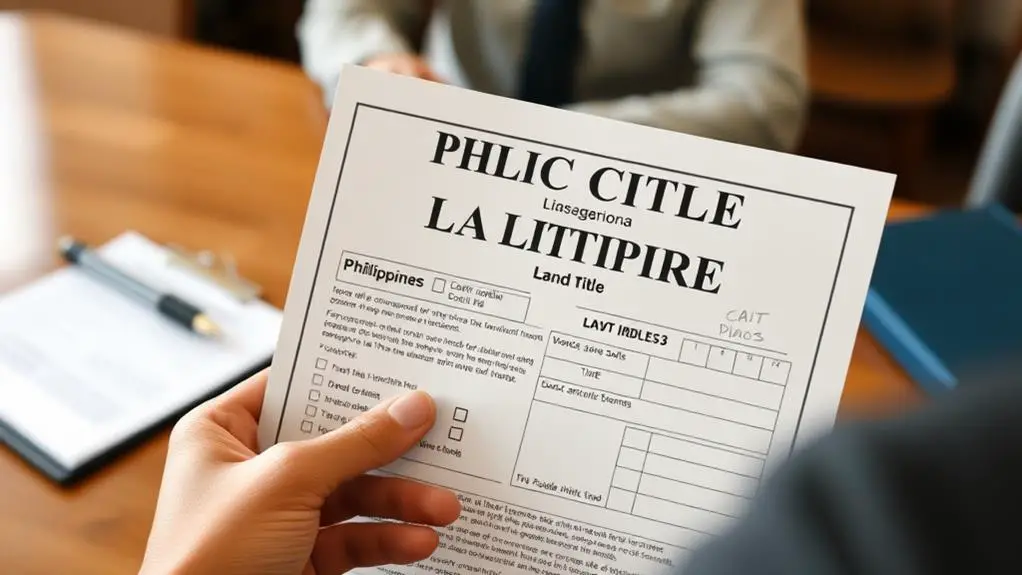
To transfer land title in the Philippines, you'll need these documents:
When transferring land title in the Philippines, it's essential to have all the required documents to ensure a smooth process. To get started, you'll need to gather the following:
- Original copies and photocopies of the Deed of Conveyance
- Valid IDs of all signatories
- Notary Public's official receipt for notarization
- Certificate Authorizing Registration (CAR) from the Bureau of Internal Revenue (BIR)
- Tax clearance documents
What are the steps to transfer land title?
The transfer process involves several steps:
- Submit the required documents: You'll need to submit the documents mentioned above to the Land Registration Authority.
- Pay transfer taxes and registration fees: As the new owner, you'll have to pay transfer taxes and registration fees upon submission of the required documents.
- Get a Notary Public to notarize the Deed of Sale: A Notary Public will validate the transaction by notarizing the Deed of Sale.
What are the tax implications of land title transfer?
When transferring land title, you'll need to consider the following tax implications:
- Documentary Stamp Tax: This tax is levied on the Deed of Conveyance.
- Creditable Withholding Tax: This tax is deducted from the sale price of the land.
- Capital Gains Tax: This tax is levied on the profit made from the sale of the land.
What happens if my documents are incomplete or inaccurate?
If your documents are incomplete or inaccurate, it may cause delays in the transfer process and potential issues with ownership rights.
To avoid this, make sure to double-check your documents before submitting them.
How much does it cost to transfer a property title in the Philippines?
The Cost of Transferring a Property Title in the Philippines: What You Need to Know
Are you buying or selling a property in the Philippines? If so, you're probably wondering how much it costs to transfer the property title. The cost of title transfer can be substantial, and both sellers and buyers incur fees.
Sellers' Fees
As a seller, you'll need to pay unpaid property taxes and capital gains tax at 6% of the selling price or zonal value. This is a significant expense, so make sure you factor it into your calculations.
Buyers' Fees
As a buyer, you'll need to pay several fees, including:
- Registration fees at 0.25% of the selling price, zonal value, or fair market value
- Transfer tax at 0.5% in provinces and 0.75% in Metro Manila
You may also need to pay for professional assistance, such as lawyers and transfer agents, to ensure a smooth title transfer process. These fees can range from PHP 20,000 in Metro Manila to PHP 30,000 outside.
The Importance of Understanding Title Transfer Costs
To avoid costly delays and ensure compliance with tax obligations and legal requirements, it's essential to work with experienced professionals and verify the integrity of the title.
How do I transfer property to a family member in the Philippines?

Transferring Property to a Family Member in the Philippines: A Step-by-Step Guide
Are you planning to transfer your property to a family member in the Philippines? This process is called a property donation, and it involves executing a Deed of Donation (DOD) that outlines the terms of the transfer.
Before you start, ask yourself:
- Do I've any outstanding payments on the property?
- Have I assessed the property's current value?
- Do I've the necessary documents for the transfer?
To initiate the process, you'll need to:
- Create a document agreement
- Have the property assessed
- Settle any outstanding payments
- Consult with legal and financial experts to ensure compliance with Philippine laws and regulations
The title transfer process involves submitting the necessary documents to the Registry of Deeds, including:
- Deed of Donation (DOD)
- Transfer Certificate of Title (TCT)
- Tax clearance
What are the benefits of transferring property to a family member?
- It can be a tax-efficient way to transfer wealth to your loved ones
- It can help avoid potential inheritance disputes
- It can ensure that your property is transferred to the right person
What are the potential risks of transferring property to a family member?
- It can have tax implications, such as capital gains tax or transfer tax
- It can affect your credit score or financial stability
- It can lead to family conflicts or disputes if not done properly
To avoid potential issues, it's recommended that you:
- Seek professional advice from a lawyer or financial expert
- Understand the legal implications of transferring property to a family member
- Follow the correct procedures and submit the necessary documents
How much is the transfer tax in the Philippines?
To transfer property to a family member in the Philippines, 0.5% of the selling price or zonal value (whichever is higher) will be levied as a transfer tax. This tax, also known as the Local Transfer Tax, varies depending on the location and type of property.
The transfer tax is just one of the costs associated with the title transfer process. You'll also need to pay the Documentary Stamp Tax and Registration Fee.
Here's a breakdown of these costs:
- Transfer Tax: 0.5% of the selling price or zonal value (whichever is higher)
- Documentary Stamp Tax: 1.5% of the selling price or zonal value (whichever is higher)
- Registration Fee: 0.25% of the selling price or zonal value (whichever is higher)
When calculating the transfer tax, you'll need to consider the selling price or zonal value of the property. For example, if you're transferring a property with a selling price of PHP 1 million and a zonal value of PHP 800,000, the transfer tax will be based on the selling price of PHP 1 million.
This means you'll pay PHP 5,000 as transfer tax (0.5% of PHP 1 million).
There are tax exemptions available, such as for transfers between family members. However, these exemptions are subject to certain conditions and requirements.
How many days to process transfer of title?
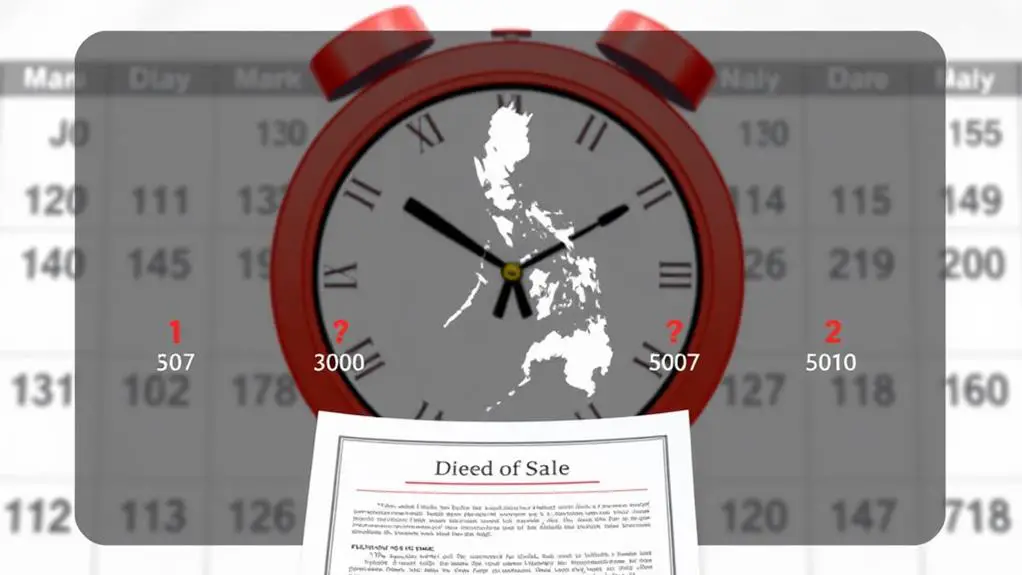
The time it takes to process a title transfer in the Philippines can range from a few weeks to several months. This duration depends on various factors, such as the efficiency of the parties involved and the completeness of the required documents.
To give you a better idea of the timeline, consider the following steps and their typical durations:
- Title processing at the Registry of Deeds: 2-4 weeks. This can be expedited if you have complete documentation.
- Obtaining a Certificate Authorizing Registration (CAR) from the BIR: 2-3 weeks.
- Updating the tax declaration at the Local Assessor's Office: 1-2 weeks.
Are you wondering what causes delays in the process? Delays can occur due to incomplete or erroneous documentation.
To minimize these delays, ensure that all required documents are complete and accurate. You can also consider availing of title expediting services to speed up the process.
Proper planning and coordination with the relevant authorities are key to ensuring that the title transfer is processed efficiently and with minimal delays.
How much to pay BIR for land transfer?
Paying BIR for Land Transfer: What You Need to Know
When transferring property ownership in the Philippines, you'll need to pay taxes to the Bureau of Internal Revenue (BIR).
To avoid penalties and ensure a smooth transfer, it's essential to understand the tax implications.
How Much Do You Need to Pay?
You'll need to pay two types of taxes: Documentary Stamp Tax (DST) and Capital Gains Tax (CGT).
DST is 1.5% of the selling price or zonal value, whichever is higher. For example, if the selling price is PHP 1 million and the zonal value is PHP 800,000, you'll pay DST on the higher amount, which is PHP 1 million.
CGT is 6% of the selling price or zonal value. Using the same example, you'll pay CGT on PHP 1 million.
What Are the Payment Methods?
You can pay these taxes through the following BIR payment methods:
- Online payment
- Bank deposit
- Over-the-counter payment
Important Reminders
- Pay these taxes before title registration to avoid delays or invalidation of the transfer.
- Ensure you pay the correct amount to avoid penalties.
- Consider these costs when negotiating the sale price, as they've significant implications on the selling price.
How do I transfer land title from parents?
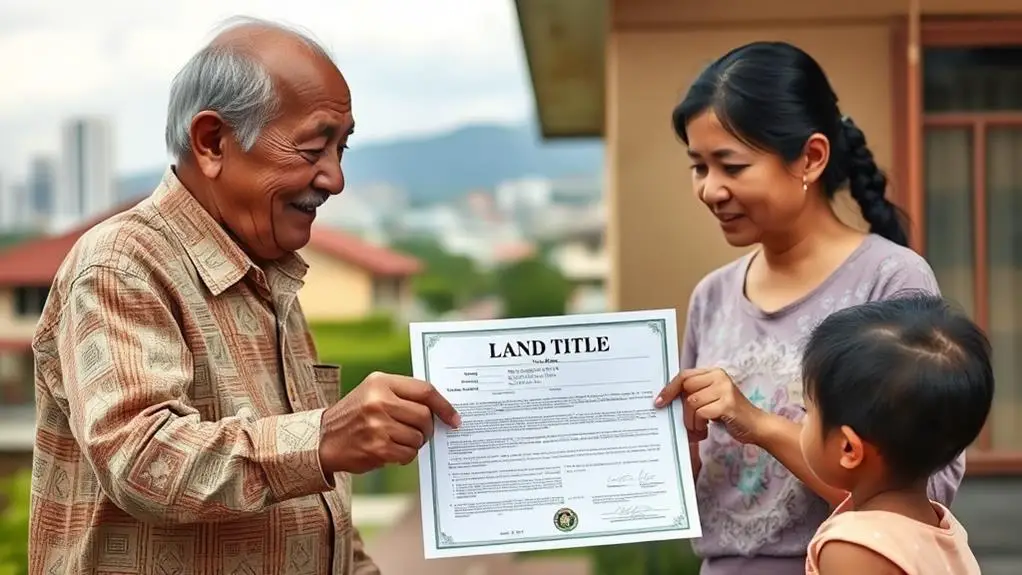
Transferring a land title from your parents in the Philippines involves several steps.
To transfer a land title from your parents, you need to follow specific procedures to avoid costly delays and potential court intervention.
First, gather the required documents. These include:
- A copy of your parents' death certificate
- A copy of the land title
- A tax identification number (TIN) for the estate
Next, determine if there's a will. If there's a will, it should outline how the properties will be distributed among the heirs. If there's no will, you'll need to execute a Deed of Extrajudicial Settlement of the Estate. This document outlines the distribution of properties among the heirs and must be signed by all heirs.
Pay the estate tax to the Bureau of Internal Revenue (BIR) to receive a Certificate of Authorized Registration (CAR). This is necessary for title registration. To do this, you'll need to:
- Obtain a property valuation to determine the correct tax amount
- File a tax return for the estate
- Pay the estate tax
After paying the estate tax, obtain the Certificate of Authorized Registration (CAR). This document is necessary for title registration.
Finally, register the land title with the Register of Deeds. You'll need to:
- Submit the CAR
- Submit the Deed of Extrajudicial Settlement of the Estate (if applicable)
- Pay the registration fee
Remember to address any potential inheritance disputes and ensure that all heirs are in agreement with the property distribution.
Who will pay the Deed of sale, buyer or seller in the Philippines?
Who pays the Deed of Sale in the Philippines?
In the Philippines, the seller usually pays for the Deed of Sale. This is according to the Civil Code, which states that the seller bears the costs of execution and registration, including notarial fees.
But why does the seller typically pay for this? It's because the seller is responsible for executing the Deed of Absolute Sale. This is a crucial document that transfers ownership of the property from the seller to the buyer.
Here are some key points to remember about the Deed of Sale:
- The seller usually pays for the Deed of Sale, including notarial fees.
- The seller is responsible for executing the Deed of Absolute Sale.
- The buyer and seller can agree on who pays for the Deed of Sale through mutual agreements or provisions in the contract.
- It's essential to review the contract and understand the fee structure to avoid potential complications.
As a buyer, you should review your contract carefully to see who's responsible for paying for the Deed of Sale.
If you're unsure, you can always ask your seller or a real estate expert to clarify.
What are the requirements for land titling?
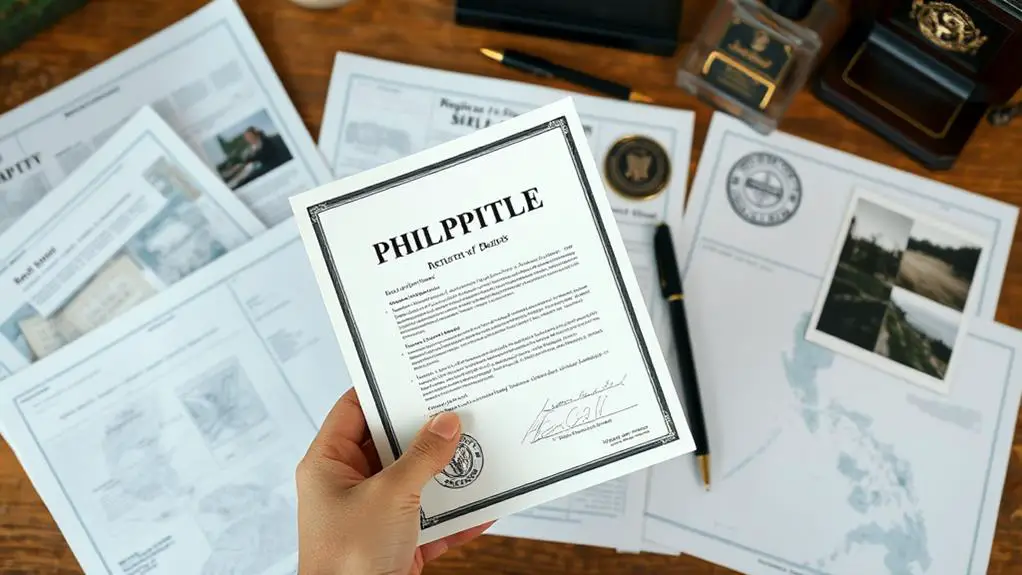
Land Titling Requirements in the Philippines
To start the land titling process, you'll need to know the requirements involved. Land titling is required to secure your land ownership rights.
You can begin by checking the land's title status. Determine if the land has an existing title by visiting the Registry of Deeds for title verification. This is usually the first step in the process.
Next, you'll need to understand the property tax implications. Check tax mapping with the local government unit (LGU) assessment office. This will help you determine the taxes you'll need to pay on the land.
To proceed with the land titling process, you'll need to obtain specific documents:
- A Certificate of No Title if the land is untitled
- A Certified True Copy of Title if the land is already titled
Keep in mind that potential land disputes may arise during the process. Consulting with a land lawyer can help you navigate these complexities and ensure a smooth transfer of ownership.
Is a Deed of sale enough proof of ownership of land?
A Deed of Sale isn't enough to prove ownership of land. You might be wondering why. The reason is that a Deed of Sale only serves as a document that transfers ownership, but it may include conditions or contingencies that can cause disputes.
To understand this better, let's consider the types of Deeds of Sale. An Absolute Deed of Sale is a document that eliminates future claims by the seller and provides clearer ownership rights. On the other hand, a Deed of Sale may retain seller rights until certain conditions are met, which can lead to disputes.
If you're buying or selling land in the Philippines, you need to know that a Deed of Sale is just one of the required documents for transferring property ownership. You'll also need a Transfer Certificate of Title, which serves as the definitive proof of ownership.
So, what can you do to avoid potential issues? Here are some steps:
- Understand the deed's legal implications
- Work with a lawyer to navigate the transfer process
- Ensure the Transfer Certificate of Title is obtained
How much is the attorney's fee for Deed of sale in the Philippines?

Attorney's Fees for a Deed of Sale in the Philippines: What to Expect
When selling a property in the Philippines, you'll likely need to hire a lawyer to help with the transfer process. One of the costs you'll incur is the attorney's fee. So, how much can you expect to pay?
The attorney's fee for a Deed of Sale in the Philippines typically ranges from 0.5% to 1.5% of the property's sale price. This fee is part of the transaction costs you'll need to consider when transferring ownership of a property.
What factors affect the attorney's fee? Here are a few things to keep in mind:
- The sale price of the property: The higher the sale price, the higher the attorney's fee.
- The complexity of the property transfer process: More complex cases may require additional work from your lawyer, resulting in a higher fee.
You may also need to pay additional fees for other services, such as:
- Reviewing and drafting legal documentation
- Conducting due diligence
- Representing you in negotiations
When hiring a lawyer, be sure to discuss and agree upon the attorney's fee upfront. This will help you avoid any unexpected costs and ensure a smooth transaction.
Who pays for the title transfer in the Philippines?
In the Philippines, the title transfer fees can be split between the buyer and seller.
When buying a property, you might wonder who pays for the title transfer fees in the Philippines. The responsibility for paying these fees is negotiable between the buyer and seller.
Typically, the seller pays for the Capital Gains Tax and the Documentary Stamp Tax. The seller usually covers these costs as part of the sale process. However, you, the buyer, might need to cover other fees.
You, the buyer, usually pay for the Transfer Tax and registration fees at the Registry of Deeds. The Transfer Tax is around 0.5% to 1% of the property's selling price or zonal value, depending on the locality. To avoid confusion, it's essential to clearly outline your financial responsibilities in the Deed of Sale.
Before finalizing the sale, consider the following costs:
- Transfer Tax: 0.5% to 1% of the property's selling price or zonal value
- Registration fees at the Registry of Deeds: varies depending on the locality
- Capital Gains Tax: paid by the seller
- Documentary Stamp Tax: paid by the seller
To avoid unexpected expenses, verify the local government fees and factor these costs into your budget.
Who pays for the Deed of sale of land in the Philippines?

Who pays for the Deed of Sale in the Philippines?
When buying or selling a property in the Philippines, it's essential to understand who pays for the Deed of Sale.
Typically, the seller pays for the original deed execution costs, while the buyer covers expenses for the first copy and additional sale-related costs.
To break down the costs, let's consider the following:
- Who pays for the original deed execution costs? The seller is typically responsible for these costs.
- Who pays for the first copy of the Deed of Sale? The buyer usually pays for this.
- Other costs to consider:
- Transfer tax: The buyer typically pays this for second-hand properties.
- VAT: The buyer pays this for new properties.
- Notary fees: These fees are often established to guarantee tax payments, and the buyer usually pays them.
It's also important to note that the Deed of Sale must be registered for legal validity, which ensures public awareness of property ownership changes.
When negotiating the costs, you can modify the responsibilities through explicit agreements between the buyer and seller.
How much is the penalty for late transfer of title?
Late Transfer of Title Penalty in the Philippines: 25% of the Transfer Tax Due, Plus 2% Monthly Interest
If you're buying or selling a property in the Philippines, you'll need to transfer the title. But what happens if you miss the deadline? You might be wondering, how much is the penalty for late transfer of title?
The penalty for late registration of title transfer can be substantial. The penalty is up to 25% of the transfer tax due, plus a 2% monthly interest on the unpaid amount. This can significantly increase the overall cost of the title transfer process.
To understand this better, let's break it down:
- 25% of the transfer tax due: If you owe P10,000 in transfer tax, the penalty would be P2,500 (25% of P10,000).
- 2% monthly interest on the unpaid amount: If you still owe P10,000 after the deadline, you'll be charged 2% interest per month. That's P200 per month (2% of P10,000).
To avoid these penalties, it's essential to register the title transfer on time. Here's what you need to do:
- Submit all required documents, including the Deed of Absolute Sale, Certificate Authorizing Registration (CAR), and tax clearances.
- File these documents with the Register of Deeds (RD) within the required timeframe.
Remember, late registration can also have tax implications, affecting your ownership rights.
How much is the extrajudicial in the Philippines?
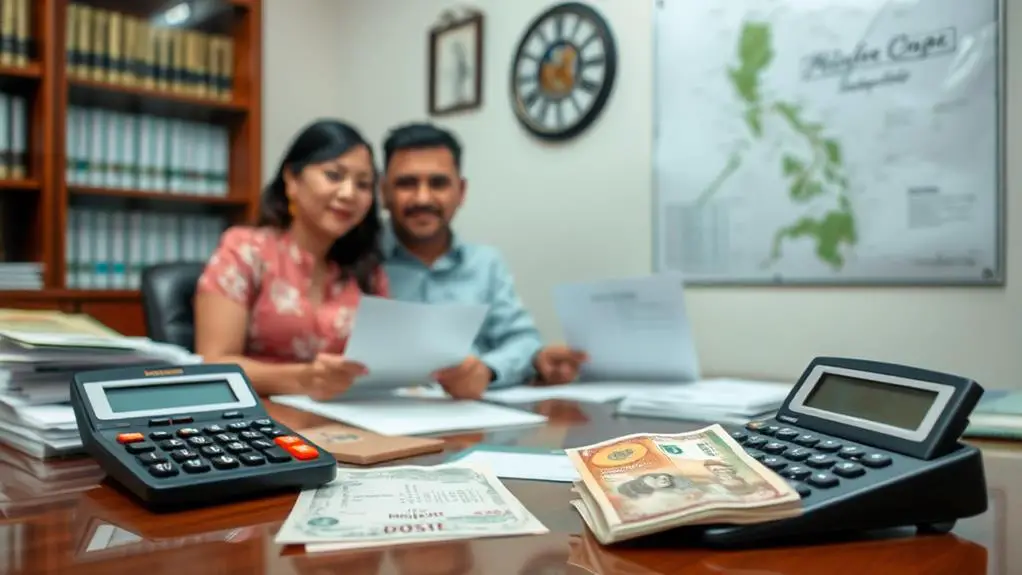
6% of the net estate value: That's the typical cost of an Extrajudicial Settlement in the Philippines, which is a cost-effective and efficient way to settle estate disputes. This process combines the Extrajudicial Settlement and Deed of Sale into one document, simplifying property transfers.
When you're planning for the costs involved in the extrajudicial settlement process, consider these additional fees:
- Are you working with a complex estate or located in a big city? Inheritance lawyer fees may vary based on these factors.
- Are you dealing with an estate exceeding 5 million? You'll need to hire an accountant, which will cost you extra.
- Don't forget about estate taxes, which are mandatory and influenced by the date of death.
So, how does the extrajudicial settlement process work? It involves a few key steps:
- Transferring property ownership
- Understanding estate tax implications
- Meeting notarization requirements
- Getting all heirs to agree to the sale of property
To avoid potential penalties, make sure you settle the estate within the required timeframe. It's also essential to plan your finances carefully to cover taxes and transfer fees associated with the process.
Do all heirs have to agree to sell property in the Philippines?
Do all heirs have to agree to sell property in the Philippines?
Yes, all heirs must agree to sell a property in the Philippines. When a property owner passes away, their heirs inherit the land equally, unless otherwise specified in a will. This co-ownership arrangement can lead to disputes among heirs.
As a co-owner, you have equal rights to the property, and your consent is required for any sale or disposition of the land. According to Article 484 of the Civil Code, this means that every heir must agree to the sale and sign the necessary documents.
Imagine you're one of five heirs to a property. To sell the property, all five heirs must agree and sign the documents. If one heir is absent, they can still grant a Special Power of Attorney (SPA) to another individual who can act on their behalf.
If you fail to obtain full consent, the sale can be invalid and challenged by absent heirs. This can lead to legal disputes and delays, putting the buyer's ownership at risk.
However, there's an alternative. You and your fellow heirs can opt for property partition, which allows you to divide the property among yourselves and sell your individual portions independently.
How much is the cost for transfer of land title in the Philippines?
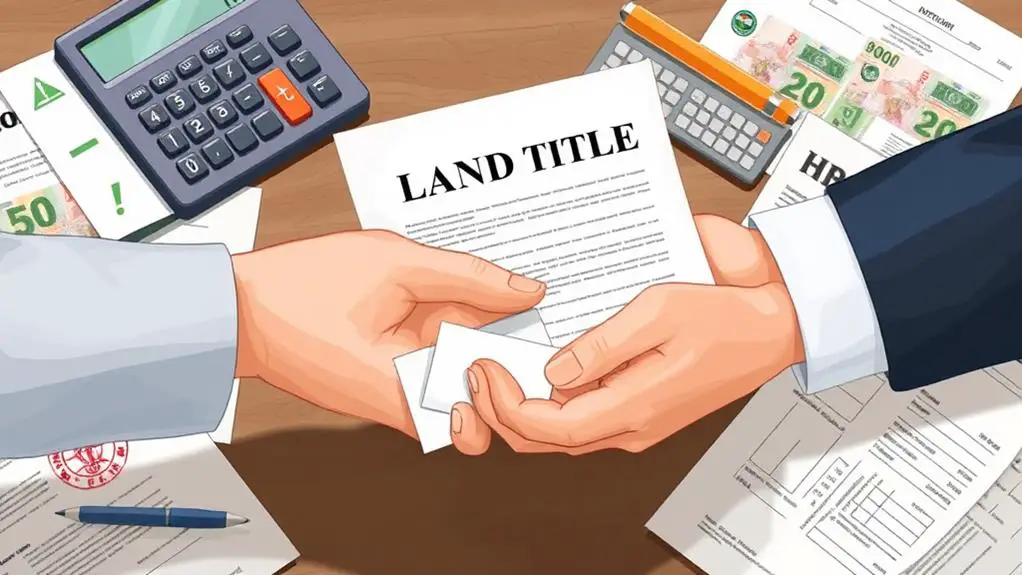
How Much Does It Cost to Transfer a Land Title in the Philippines?
You're about to finalize the land title transfer in the Philippines, and understanding the costs involved is crucial. The total cost for transferring a land title in the Philippines includes various fees, taxes, and charges. Consider the following costs to get a better idea:
- Documentary Stamp Tax (DST): 1.5% of the selling price or zonal value of the property. For example, if the selling price is ₱500,000, the DST would be ₱7,500.
- Capital Gains Tax (CGT): 6% of the selling price or zonal value, whichever is higher, after deducting the seller's capital gains tax exemption and other deductions. Using the same example, if the selling price is ₱500,000, the CGT would be ₱30,000.
- Transfer Tax: 0.5% to 0.75% of the selling price or zonal value of the property, depending on the location. For instance, if the selling price is ₱500,000 and the location has a transfer tax of 0.5%, the transfer tax would be ₱12,500.
These costs are usually based on the property valuation, which can be determined by the zonal value or the selling price of the property.
As part of the land transfer process, you'll typically assume the buyer responsibilities, including paying the transfer taxes and registration fees. On the other hand, the seller is responsible for securing the necessary documents and complying with their tax obligations, including the tax implications of the sale.
What are your responsibilities in the land transfer process?
As a buyer, you'll be responsible for:
- Paying the transfer taxes and registration fees
- Ensuring the property valuation is accurate
- Completing the necessary documents for the land transfer
As a seller, you'll be responsible for:
- Securing the necessary documents for the land transfer
- Complying with your tax obligations, including the tax implications of the sale
- Providing the necessary information for the property valuation
Who will pay the transfer of title, buyer or seller?
Transferring a title in the Philippines comes with various costs. Who pays these costs – the buyer or the seller?
The answer is both. The costs are split between the buyer and seller. Let's break it down to understand each party's responsibilities.
Seller's Responsibilities:
* Real Estate Commission (typically 5%-6% of sale price)
The seller usually pays this fee, which can range from 5% to 6% of the sale price. This fee is paid to the real estate agent for their services.
Buyer's Responsibilities:
- Appraisal Expenses (average cost of around $350)
- Inspection Costs (average cost of $250 to $700)
As the buyer, you'll need to pay for the appraisal expenses and inspection costs. These fees help ensure the property is in good condition and worth the sale price.
Shared Responsibilities:
- Escrow Fees (typically 1% of purchase price, split 50-50)
- Title Insurance Responsibilities (owner's and lender's title insurance)
Both the buyer and seller split the escrow fees, which typically amount to 1% of the purchase price. They also share the title insurance responsibilities, which protect both parties from potential title issues.
How to avoid estate tax in the Philippines?
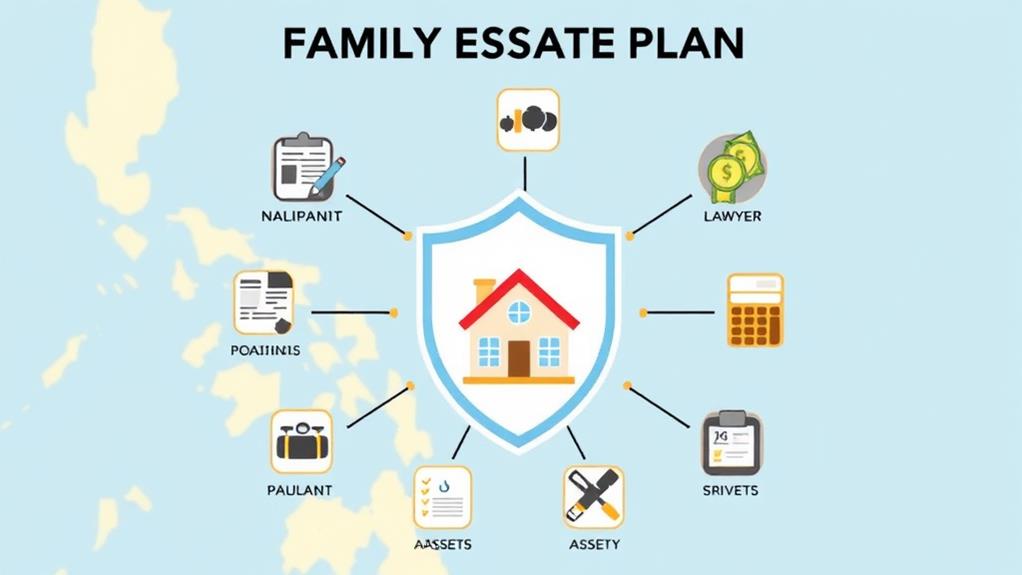
Minimizing estate tax liabilities in the Philippines requires understanding succession and estate tax laws that govern property transfer.
Effective tax planning is key to managing your estate tax obligations.
To minimize estate tax, you can utilize available exemptions and deductions.
You can reduce your estate tax liability by claiming the standard deduction of P5,000,000 and the family home deduction of up to P10,000,000.
Other strategies to reduce your estate tax liability include:
- Creating an irrevocable trust to establish a lower donor's tax basis and reduce your estate tax liability. For example, if you own a property worth P10 million, creating an irrevocable trust can help you avoid paying estate tax on the full amount.
- Utilizing tax-free exchanges, such as exchanging family-owned assets for stock in a corporation. This can be done under Section 40(C)(2) of the Tax Code. For instance, if you own a family business, you can exchange your shares for stock in a corporation without paying estate tax.
- Taking advantage of annual gifting of up to P250,000 to utilize the donor's tax exemption and reduce your estate tax liability. You can give P250,000 to your children or relatives each year without paying donor's tax.
Before making any transfers, consider your long-term financial needs.
Seeking advice from tax, legal, and financial advisors can help you optimize your estate planning strategy and minimize your estate tax liability.
What documents are required to transfer land title?
Transferring land title requires gathering specific documents.
The original deed or instrument, certified copy of the latest tax declaration, and owner's copy of the Certificate of Title are essential documents needed for this process.
Are you unsure what documents you need to prepare? Here are the key documents required for transferring land title in the Philippines:
- Original deed or instrument
- Certified copy of the latest tax declaration
- Owner's copy of the Certificate of Title
- Certification of Authentication from the Philippine Consulate (if documents were executed abroad)
- Certified true copy of the title
To obtain a certified true copy of the title, you'll need to:
- Write a letter of request
- Provide a photocopy of the title
- Show a valid identification card
- Submit documents to the appropriate office
It is crucial to ensure all documents are legible and properly certified to avoid delays in the registration process.
Can I claim ownership of land I have used for 20 years in the Philippines?
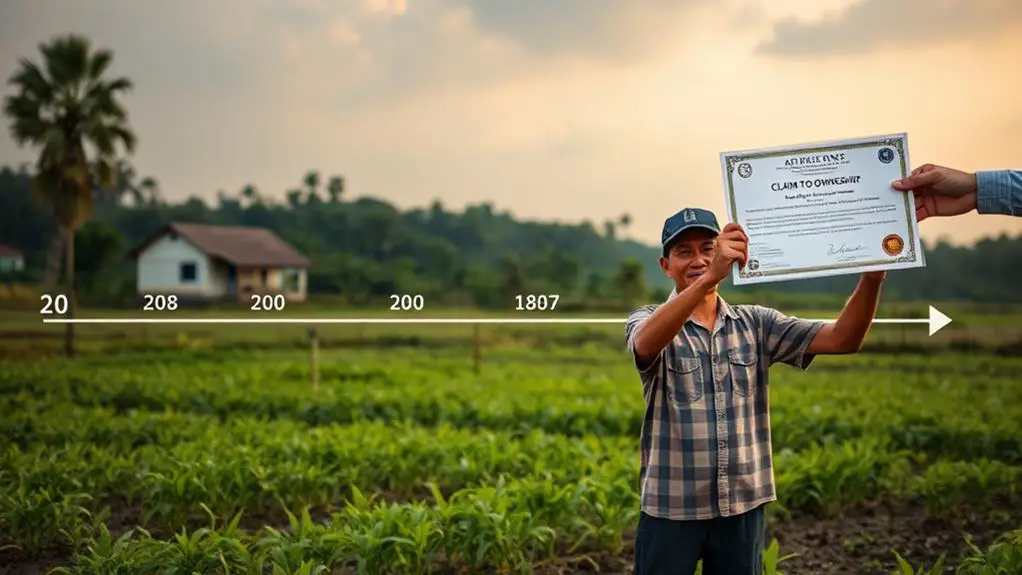
You might think that occupying a piece of land in the Philippines for 20 years is enough to claim ownership, but it's not that simple. You must meet certain requirements to claim land possession rights through adverse possession.
To start, you need to understand what adverse possession means. It's a way to gain ownership of land by possessing it openly, continuously, exclusively, and notoriously for a certain period.
So, how do you prove this? You'll need to demonstrate the following:
- Open possession: You must have used the land in a way that's visible to others. This could be by building a house, farming the land, or using it for other purposes.
- Continuous possession: You must have possessed the land for 20 years or more without any gaps or breaks.
- Exclusive possession: You must have sole control over the land and not shared it with anyone else.
- Notorious possession: Your possession of the land must be widely recognized by the community.
To support your claim, consider gathering the following documents:
- Tax declarations
- Land surveys
- Other records that show you've possessed and used the land
It's also essential to establish a clear timeline of your possession. You should provide a detailed account of your possession and use of the land, including the dates and circumstances of your initial entry.
Meeting these requirements and providing sufficient evidence is crucial to establishing land possession rights. By doing so, you can secure land tenure security through the property registration process.
What is proof of land ownership in the Philippines?
Proof of land ownership in the Philippines is typically established through a combination of formal documents and established possession.
To prove you own a piece of land, you'll need to meet certain requirements. These may include presenting a Certificate of Title, which is considered the best evidence of ownership. This certificate is conclusive against the world, except in cases of fraud.
So, what're the documents you'll need to prove land ownership? Here are a few examples:
- Certificate of Title: This is the most important document that proves you own the land.
- Deed of Sale: This document shows that you've purchased the land from someone else.
- Other relevant documents, such as tax receipts or property assessments.
Possession rights are also crucial in proving land ownership. This means that actual physical holding or occupation of the land can be used as evidence of ownership. For example, if you've been living on the land for years, or if you've built a house or farm on it, this can be used as proof that you own the land.
But what if there's a dispute over the title? In this case, the distinction between ownership and possession becomes critical. Understanding this distinction is essential to navigating potential title disputes and ensuring your rights as a landowner are protected.
To sum it up, proving land ownership in the Philippines requires a combination of formal documents and established possession. By understanding what documents you need and how to establish possession rights, you can protect your rights as a landowner.
What are the BIR requirements for land title transfer?
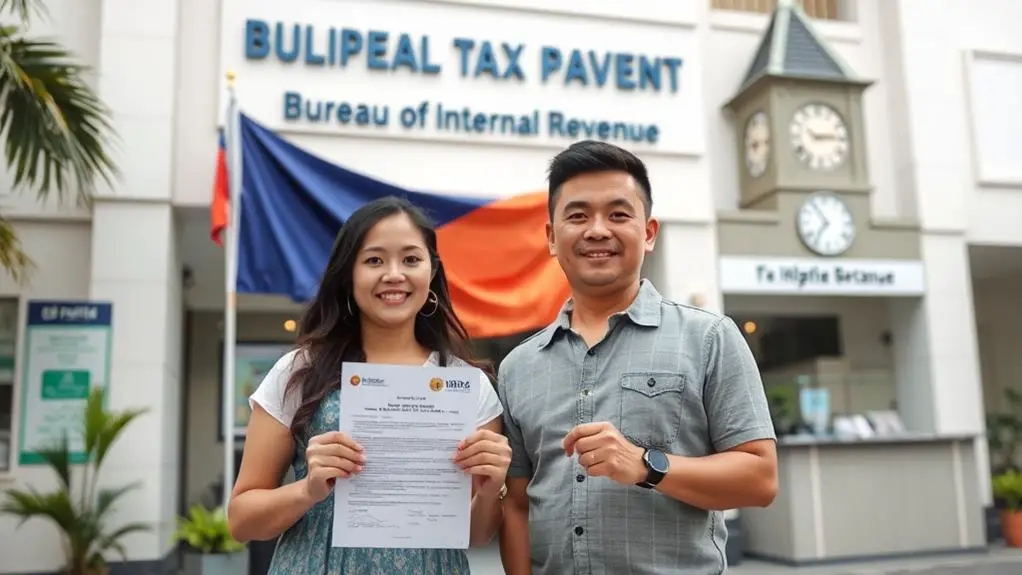
Transferring land ownership in the Philippines can be complex, but breaking it down into steps can make it more manageable. The Bureau of Internal Revenue (BIR) plays a significant role in this process, and you must comply with their requirements to avoid penalties.
What documents do you need to submit to the BIR?
To start the BIR process, you'll need to submit the required documents to the BIR Revenue District Office (RDO) for tax computation. These documents include:
- Deed of Absolute Sale or relevant deed of conveyance
- Tax Identification Numbers (TIN)
- Notarized deeds
What are the key BIR requirements for land title transfer?
To complete the BIR requirements, you'll need to:
- Obtain a Certificate Authorizing Registration (CAR) from the BIR after paying the transfer tax.
- Pay the transfer tax within 60 days from notarization of the deed of conveyance.
- Submit documents and pay the fee for the CAR at the BIR RDO.
After paying the transfer tax and obtaining the CAR, you can proceed with title registration and deed notarization. By following these BIR requirements, you can ensure a smooth land title transfer process in the Philippines.
Who pays notary fees, buyer or seller in the Philippines?
Who pays notary fees in the Philippines: the buyer.
When buying a property in the Philippines, you'll need to consider notary fees as part of the land title transfer process. These fees cover the cost of notarizing documents, such as the Deed of Sale.
The notary fee structure is usually calculated as a percentage of the property's selling price, ranging from 1% to 1.5%. To give you a better idea, you can estimate around 1,000 PHP for every 1,000,000 PHP of the transaction value. However, this can vary depending on the notary public's rates and the property's value.
You might be wondering if you can negotiate the notary fees. The answer is yes. You can negotiate with the seller to split the costs or decide who pays the fees. To avoid any disputes, it's best to clarify who'll pay the notarial fees before finalizing the transaction. You can include this agreement in the buyer-seller agreement.
Some key points to remember:
- Notary fees are usually paid by the buyer.
- The fee structure is calculated as a percentage of the property's selling price.
- You can negotiate the notary fees with the seller.
- Clarify who'll pay the notarial fees before finalizing the transaction.
Who pays capital gains tax in the Philippines, buyer or seller?

Who pays capital gains tax in the Philippines?
In the Philippines, the seller typically pays the capital gains tax (CGT) when buying or selling a property.
But there are some cases where the buyer might be responsible.
When is the seller responsible for paying capital gains tax?
The seller pays the CGT, which is 6% of the property's selling price, zonal value, or fair market value, whichever is highest.
When might the buyer be responsible for paying capital gains tax?
There are some exceptions where the buyer might need to pay the CGT:
- If the seller is a non-resident of the Philippines, the buyer may be responsible for paying the CGT.
- In cases of inherited or donated property, the new owner (recipient) pays the capital gains tax.
- If the buyer and seller agree to different arrangements in their contract, the buyer may be responsible for paying the CGT.
Why is it essential to know who pays the capital gains tax?
It's crucial to consider these capital gains implications when negotiating your property sale agreement to avoid potential disputes.
Make sure your agreement clearly outlines the tax payment responsibilities.
